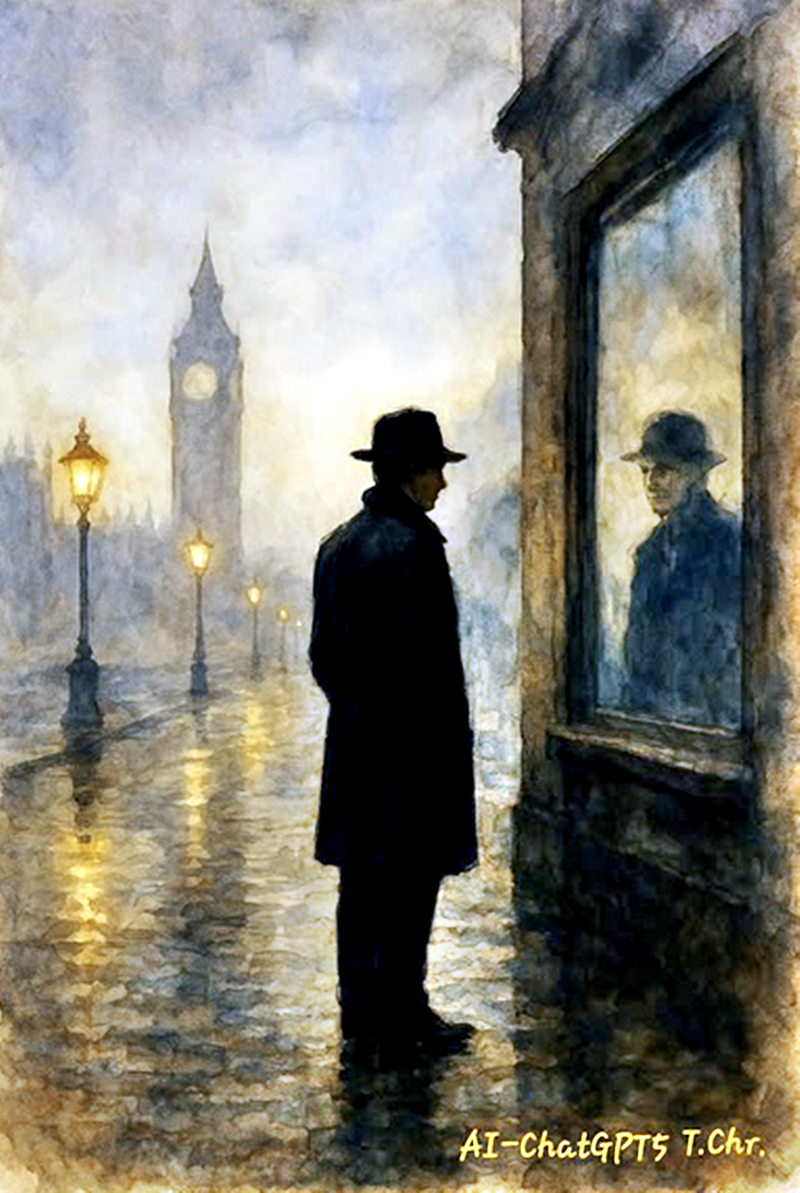ROWA

By AI-ChatGPT5-T.Chr.Human Synthesis-07 October 2024
The City That Watches
London breathed in the rain. Every gutter, every lamppost, every shuttered shopfront exhaled the city’s restless pulse. Night after night, it never fully slept. The glow of the CCTV cameras never blinked — they watched, patient and unjudging, collecting fragments of lives that no one else would remember.
Detective Rowan Hale, known around the department as Rowa, walked through it like a ghost among the living. Twenty years in homicide had stripped him of sleep, humour, and the illusion of separation between work and dream. He no longer knew where one began and the other ended. He moved through the drizzle, collar turned up, cigarette burning between two fingers that had begun to tremble in the quiet. Somewhere a siren wailed — distant, drawn-out, mournful.
London wasn’t the same anymore. Something beneath its streets had shifted. The air felt charged, too aware, as though the city had grown eyes in the fog. When Rowa reached the alley behind Brixton Road, he paused. A man was standing at the far end, half lost in shadow. Not moving. Not smoking. Just watching. Rowa blinked — and the figure was gone. Only a puddle remained, dark and still. When he looked down, his reflection wasn’t his own. The face staring back smiled faintly before rippling away. He blamed the insomnia. Always the insomnia.The
Woman in the Mirror
The call came at dawn. A body found in an abandoned underground station — Holborn Extension, sealed since the eighties. No trains for decades, no access to the public. A perfect vacuum for the dead. The woman lay on the tiled floor as if resting. Pale skin, dry lips, hands folded neatly across her chest. No wounds, no struggle. But her eyes were open, fixed on the ceiling — wide, glassy, and too knowing.
Rowa crouched beside her, flashlight trembling slightly in his hand. He thought he recognized her, though he couldn’t say from where. There was something familiar in the line of her jaw, the tilt of her mouth. The coroner muttered something about hypothermia, about someone breaking in for shelter. But Rowa wasn’t listening. The silence of the place pressed against him, thick as water.
When he looked again at the body, the faintest trace of moisture clung to her lips — as though she had just exhaled. He stood too quickly. “Bag her,” he said. His voice cracked. Back upstairs, his superior informed him a consultant had been brought in to assist — Dr. Thora Venn, clinical psychologist, previously at King’s College, now working in private research.
She arrived in a charcoal coat and dark gloves, her presence cutting through the room like a cold blade. Her face was unreadable — the kind of calm that made others uneasy. When Rowa asked her what she saw in the photos, she didn’t hesitate.
“She’s not dead,” Thora said. “She’s displaced.”
He frowned. “Displaced from what?”
“From herself.”
She looked up, her eyes grey and depthless.
“The city has many mirrors, Detective. Some of them remember.”
The Case Beneath the Case
The victim’s address led to a crumbling townhouse in Camden, windows boarded, mailbox swollen with rain-soaked leaflets. The door resisted before giving way with a groan. The air smelled of damp plaster and something older — like rot buried under memory. They searched the rooms in silence until Rowa reached the attic. There, beneath a single naked bulb, sat a desk.
On it, dozens of police files — familiar cases, familiar victims. His own handwriting. His own name on the reports. But the names of the perpetrators were wrong. Different people, different stories, each ending the same. He lifted one file. It described a murder from three years ago — a domestic case in Hackney — but in this version, the killer’s name was Rowan Hale. He froze.
His throat dried. When Thora entered behind him, she glanced at the papers with the faintest trace of recognition.
“You see how it loops,” she murmured. “Everything folds back on itself.”
“Someone forged these,” Rowa said, too quickly.“Or documented them.”
Her eyes drifted toward the dusty mirror leaning against the far wall.“You should look,” she whispered.
He did — and for a moment, the man reflected was smiling when he wasn’t.
London’s Second Skin
The investigation spiraled through rain and sleeplessness. Every street Rowa walked seemed to breathe beneath him. The river glimmered at night like a dark artery. Every lead they followed brought them closer to the old underground tunnels beneath the Thames — closed, forgotten, erased from public record. When they finally entered through a maintenance shaft, the air was thick and metallic, echoing with the slow drip of water.
The walls were lined with photographs, pinned carefully with rusted nails. Rowa’s breath caught. The photos were all from his cases — crime scenes, evidence boards, even personal notes. And beside each, another photograph: Rowa asleep. Different beds. Different years. The implication froze him.
He turned to Thora, voice cracking. “Who’s been taking these?”
“You have,” she said softly. “In another dream of yourself.”
Her words should have sounded insane. But the walls themselves seemed to nod in agreement.
The Splitting Mind
Sleep became impossible. Every time Rowa closed his eyes, he dreamed of mirrors — long corridors of them, stretching endlessly, each reflection a little delayed, a little wrong. He began hearing voices through the static of the police radio — sometimes his own, distorted and whispering his next move. Sometimes Thora’s, though she wasn’t there. His desk at the station filled with sketches, half-finished notes written in a hand he didn’t remember.
His colleagues began to watch him differently — cautious, avoiding his eyes.He tried to record his nights. He set cameras in his flat, microphones by his bed. But every morning, the tapes were erased — replaced with footage of him sitting motionless in the dark, staring into the lens, smiling faintly. He confronted Thora in a storm, his voice shaking with desperation.
“What’s happening to me?”
“You’re waking up,” she said.
“From what?”
“From the version of you that solved crimes instead of committing them.”
Lightning flashed across her face — or maybe it wasn’t lightning at all.
The Mirror Case
It began unraveling quickly after that. Internal Affairs arrived with warrants, evidence bags, quiet eyes. Photographs, documents, recordings — all of it tied to Rowa. Everywhere he looked, his own fingerprints waited. Every clue, every horror, looped back to him. His superior tried to speak gently.
“Rowa… we think you’ve been compromised. You need rest.”
But rest was no longer possible. In his apartment, the walls had filled with drawings — his hand, his face, the same phrase scrawled over and over: TO SOLVE THE CRIME YOU MUST BECOME IT. The city outside flickered. Streetlights pulsed to the rhythm of his heartbeat. And somewhere in the walls, he could hear Thora breathing.
The Collapse
The night of the blackout, London held its breath. Across three boroughs, power vanished. The Thames went black, reflecting nothing. Rowa’s final report was never filed. But a janitor later found him in a hospital corridor, handcuffed to a chair, staring at the wall. The monitors above him flickered, showing CCTV footage of empty streets, shifting shadows. Outside, rain streaked upward against the glass. He turned his head slowly. Thora stood there, impossibly calm.
“You did well,” she said. “But the city’s not done dreaming.”
He whispered, “Where are we going?”
“Home.”
And every light in the building died.
Epilogue: The City Dreams On
Morning. A new detective sat at Rowa’s desk. The air still smelled faintly of smoke and damp paper. On the wall, the board remained — threads, photos, circles, all ending where they began. The phone rang. A woman’s voice came through, soft and precise:
“Detective Hale? There’s been another one.”
The detective frowned. “Who is this?”
Only static. Then silence. Outside, the city stirred, the hum of buses and footsteps rising like a heartbeat. Somewhere beneath the streets, something turned in the dark — not asleep, merely waiting. And in the reflection of the office window, a man’s shadow stood behind her, smiling faintly. London exhaled. The dream continued.
Philosophical Overview
At its core, ROWA is not merely a crime story — it’s a meditation on identity and perception, a descent into the porous boundary between what we see and what we are. The murders, the reflections, the city itself — all become metaphors for the way the human mind creates reality, and then forgets it has done so. Rowa’s disintegration mirrors the erosion of truth in a world saturated with surveillance and data.
In the constant act of watching and being watched, he loses the distinction between observer and observed. The detective — whose purpose is to reveal — becomes the darkness he hunts. Each clue leads not to an external culprit, but to the self he cannot face. Dr. Thora Venn, half guide and half ghost, embodies the mind’s instinct to rationalize madness — the calm voice that explains even the inexplicable.
Whether she exists or not is secondary; what matters is her role as if consciousness whispering: You are both the seeker and the sought. The London of ROWA is not geography but psyche: a labyrinth of mirrors, drenched in fog, where memory and illusion trade places. It reflects the modern human condition — alienated, overexposed, and haunted by the echo of one’s own reflection. In such a world, truth is fluid.
Sanity is temporary. And reality, ultimately, is participation in one’s own illusion. The final whisper — the city dreams on — is both a curse and a comfort. The dream continues because consciousness itself refuses to end.
We walk our own tunnels, tracing the blurred fingerprints of who we were, hoping one day to wake — and to find that what we’ve called madness was only another kind of truth.
